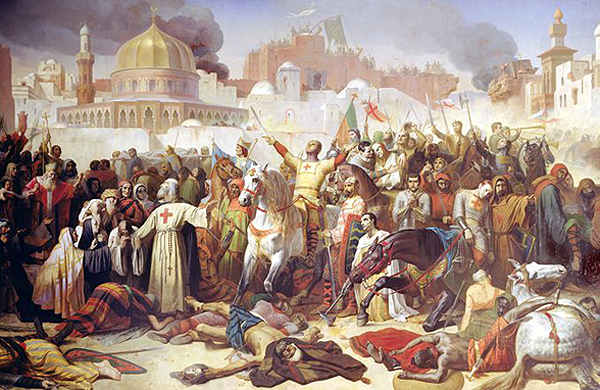 Unusual message from the Lufthansa purser: “Please prepare for an immediate landing.” But we’re a long way… “Make sure that you leave behind all personal belongings if asked to evacuate.” Evacuate? I look out the window. “Tray tables now immediately to upright positions.”
Unusual message from the Lufthansa purser: “Please prepare for an immediate landing.” But we’re a long way… “Make sure that you leave behind all personal belongings if asked to evacuate.” Evacuate? I look out the window. “Tray tables now immediately to upright positions.”
But we’re three-quarters of an hour before the scheduled landing! The whole jammed-pack aircraft is now filled with erect, silent passengers – some like me in window seats, squashing their noses against the glass for a better view.
The plane seems to take a nose dive then finally we see the coast through heavy Mediterranean haze. My first impressions from 15000′ as we veer inland is that we’re landing on a futuristic planet. Hundreds, maybe thousands of smallish, squarish, stucco buildings each identical to the other form little cookie-cutter metropolises.
A minute later we’re over a different cookie-cutter metropolis, maybe slightly highrisish metallic boxes but still all the same. It’s hard to imagine how these millions of people find their little domicile in these residential beehives.
It’s as if creativity has been banned for efficiency.
The more we descend the more everything looks the same: houses, parched landscapes, congested highways with cars that all look alike. The plane lands. It’s a small runway with not many bells and whistles, mostly desert-blown sage grasses. Not a huge airport but bigger than Dubuque.
We’re landing in Tel Aviv, that’s all.
America readies itself for suicide. Russia has its forefinger on nuclear apocalypse. Somali is starving as Ukrainian wheat molds. Britain parties itself to destruction. Brazil decides today whether the world breathes. The world’s richest man now says which of the foregoing is a lie or only a little exaggeration.
I’m fascinated with maps. Got old ones hanging all over my office, stuffed in drawers, sketched in notebooks. Couldn’t wait to visit the first map of Jerusalem that was on display in the British Library a few years ago. What a remarkable experience! All the world, no the universe (!) was drawn on maybe its first map, humanity’s first city, its first organized civilization… Jerusalem.
Now I’m here for the first time, for the first day. In one day I saw a horribly regimented society under constant threat of annihilation. I spoke with East Jerusalem Palestinians who were born here, can’t vote, and can’t travel and who told me all that with a smile.
Kathleen and I walked late at night down a two-lane main street revved with motorcycles and Halloween party-goers and good restaurants tucked into quiet streets. We walked into a little 7-11-like shop on a roundabout by the a stadium where high schoolers were just leaving a basketball game. We needed milk for our tea. Wouldn’t do that at home. But this is the most troubled place on earth.
It always has been. For 2500 years the area which is today Israel was a quiet, productive agricultural paradise inching towards some kind of leap forward. Personally I think that leap forward was the first human religion, or better perhaps described as faith. Increasingly productive humans began making decisions not only on simple facts of survival, but complex myths as faiths.
Curiosity found some understandings but every act of discovery, after all, is a terrifying assertion of a million more unknowns. The Unknown became mankind’s first universal threat. We haven’t handled it too well.
When Jerusalem coalesced with these astonishing new human understandings nomads traded in their wandering for homes built of stone. Roads invited directions for all life’s responsibilities. Scratches on rocks became calligraphy on parchment. Random noises from the wilderness grew into symphony orchestras.
So precious suddenly was human existence that walls were built to protect it.
Inside-the-walls and Outside-the-walls defined two irreconcilable tribes. No longer divided by levels of cognizance or mobility or mortality and procreation, we divided ourselves by faith.
Jerusalem was the capital and King David’s faith beckoned him to become its divine protector. Ruthlessly he slashed his way to the throne. Torrents of blood raged not to procure a water hole or fecund pasture, but to defeat a wrong way of believing.
King David wasn’t going to let any fears interrupt his people from using new-found irrigation, and he wasn’t going to tolerate other myths that tried to explain the unknown! It was 1000 BC.
Three thousand years later the two tribes have branched into thousands. Persians slaughtered Greeks. Romans massacred barbarians. Muhammadans retook Jerusalem in a sea of blood. A half dozen crusades impoverished the Middle Ages and probably fomented global slavery.
Not everyone liked what was going on. Stanley wrote two volumes of complaints and bewilderment as to why the world asked him to extract a German entomologist from a Mahdist’s rout of British imperialism! Humanists, Buddhists, Pacifists all tried and moments of sanity provoked some men to create the art of compromise. But the vengeance demanded by King David’s genocides blossomed from one generation into another.
Whatever’s happening in the world, today, all started here. We begin our exceptional four-day discovery in Jerusalem, tomorrow. Stay tuned.